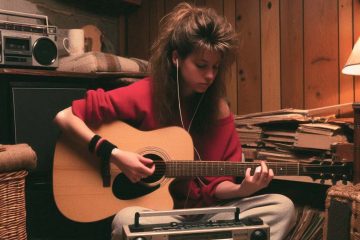Going Through Your Woodpile
I’m not much of a woodworker but I enjoy it. I’ve built a gate for our chicken yard. I’ve made some synth stands for the studio out of pallets and scrap wood. For this reason, I like keeping bits of leftover wood just in case the woodworking bug bites in the future.
Like keeping those bits of wood that could “be something”, I have a pile of song ideas that have been sketched out and stored on my harddrive.
I’ve gotten a lot better at writing, finishing and releasing music more frequently in recent years. This means I am visiting my woodpile more frequently to continue the cadence of writing and releasing.
Absence Gives Clarity
I was going through my figurative woodpile recently and I was struck by how quickly I forget the ideas I’ve had. I’m often excited all over again when I rediscover a song I was working on.
There is also a renewed clarity about the song that helps me hear more clearly what I need to do next. This is nothing new of course. Artists have been doing this for as long as there have been artists. However it did give me an idea about harnessing this “clarity” to finish more songs.
Leveraging Parkinson’s Law To Finish More Music
Parkinson’s Law states that work will expand to fill the time allowed for it. That’s one reason why we often wait until close to the due date to finish that assignment that we had two weeks to finish. If this is the case then you can hack the tendency to help you finish more songs.
I’ve had this idea floating around for a while and tried it in various forms such as the 20 min song sketch challenges or work on a new song for every 30 minutes over a two hour period.
A Checklist To Finish More Songs
When I was going through my woodpile recently I mapped out my process of writing, recording and mixing with blocks of time. Again, nothing particularly mind blowing but the twist was adding a pause before finishing to take advantage of the “absence gives clarity” effect.
Here’s my current blocking of time:
- Song writing: 1 hour
- Sketching out song: in DAW: 1 hour
- Recording parts, arranging and production: 4 – 6 hours
- Mixing: 3 – 6 hours
- Take A Break (Incubate): 3 – 5 day break
- Listen, make notes then tweaks: 1- 2 hours
- Finalise mix and send to mastering: 1 hour
“in all directions… happy ideas come unexpectedly without effort, like an inspiration. So far as I am concerned, they have never come to me when my mind was fatigued, or when I was at my working table…. They came particularly readily during the slow ascent of wooded hills of a sunny day.”
German Physicist, Hermann von Helmholtz
Incubating Your Songs
The “absence gives clarity” idea can be tied in with the idea of an incubation period in relation to creative problem-solving and memory consolidation.
Coined in 1926 by Graham Wallas as part of his four stages of the creative process:
- Preparation
- Incubation
- Illumination
- Verification
Incubation refers to the unconscious processing of information or problems that occurs when we step away from conscious effort and focus on other things.
The “Aha!” Moment
Incubation often leads to sudden insights or “Aha!” moments, where solutions or creative ideas seem to appear out of nowhere after a period of rest or distraction.
I personally find the creative juices flow when I’m throwing the ball for my dog or walking around in our back paddock. Walking is definitely a thing.
Why Does Taking A Break Work?
- Reduced Fixation: If you’ve been up to your elbows in a song, you know about getting fixated on something. Incubation allows us to break free from mental fixation. Step away from the computer screen and the song.
- Unconscious Processing: The mind is pretty phenomenal. The subconscious mind is capable of processing vast amounts of information in parallel, making connections that the conscious mind might miss. I’ve even had this happen when practising guitar. Work hard on something for 15 minutes, walk away and do something else, come back in 30 mins and your brain has been working in the background and you have more proficiency than you had previously.
- Spontaneous Insight: Incubation allows for spontaneous insights to emerge without the constraints of conscious effort. This is the ultimate hack, and I love the anti-grind aspect.
- Memory Consolidation: Sleep is a form of incubation that helps consolidate memories and enhance learning. “Sleeping on it” definitely helps creative and problem solving processes. I was reminded of this example from “Peak” by K. Anders Ericsson:
“Over the period of a week they also spent an average of 2.8 hours of napping in the afternoon: about two hours longer than the average. Sleep, the authors of the study concluded, allowed these top performers to regenerate so that they could practice with greater concentration. Not only did they practice more, they also got more out of those hours of practice because they were better rested.”
The Takeaway
Whether you’ve realised it or not, grinding on something hits a point of diminishing returns. You shouldn’t give up as soon as something gets hard either BUT you have to be aware of your thresholds.
I personally like to work in sprints of 40 – 50 mins and then get up and take 5 mins to do something else. I feel like I can go for longer BUT will I get the best results? How can you tell? You need to test some methods out for a week or two and see what works for you. You are the guinea pig and the scientist.
All the best with your music making!



0 Comments